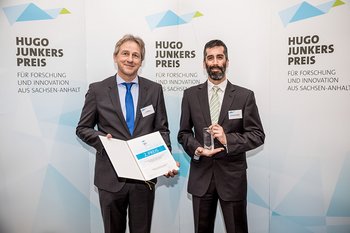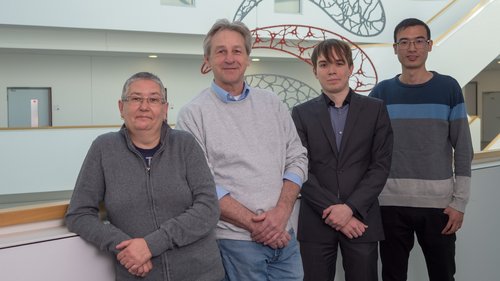Neurogenetik & Maus-Phänotypisierung
Das Neurogenetik-Labor stellt hervorragende wissenschaftliche Expertise und Technologie zur Untersuchung von Mausverhalten und Mausgenetik bereit. Die Neurogenetik untersucht erbliche Voraussetzungen für die Funktionen des Nervensystems. Unser Labor konzentriert sich auf die genetischen Grundlagen von Lernen und Gedächtnis.
Die Maus als Modellsystem lässt sich genetisch gezielt verändern und besitzt ein hochentwickeltes Säugetiergehirn. An Mäusen gewonnene Erkenntnisse können deshalb auf den Menschen übertragen werden. Aus unserer Grundlagenforschung ergeben sich Bezüge zu menschlichen Erkrankungen wie Alzheimersche Demenz oder Autismus, aber auch zu pathopsychologischen Zuständen wie Depression und posttraumatische Belastungsstörung.
Thematische Schwerpunkte der Arbeitsgruppe bilden Untersuchungen neuer pharmakologischer Substanzen zur Behandlung der Alzheimerschen Demenz und die Funktion des Neuroplastins in Lern- und Gedächtnisvorgängen.
- Leiter
Leiter

Dirk Montag leitet das Neurogenetik-Laboratorium am LIN. Nach dem Studium der Biochemie in Tübingen promovierte Dirk Montag 1989 am Max-Planck-Institut für Biologie. Durch Forschungsarbeiten in den USA (Scripps Clinic 1989-1991) und der Schweiz (ETH-Zürich 1991-1997) spezialisierte er sich auf dem Gebiet der neuralen Zellerkennungsmoleküle.
1997 wechselte Dirk Montag an das LIN zur Gründung einer Forschungsgruppe und habilitierte 1998 an der ETH und der Universität Grenoble. Seit 1998 ist Dirk Montag Privatdozent an der Otto-von-Guericke-Universität Magdeburg.
- Mitglieder
Mitglieder
Leiter PD Dr. Dirk Montag +49-391-6263-94241 dirk.montag@lin-magdeburg.de Doktorand Xiao Lin +49-176-58754669 xiao.lin@lin-magdeburg.de Technische Mitarbeiterin Karla Sowa +49-391-6263-94231 karla.sowa@lin-magdeburg.de - Projekte
Projekte
Bei unserem Schwerpunktthema – Funktionen des Neuroplastins – haben wir in den vergangenen Jahren sehr große Fortschritte erzielt. In unserer Erstbeschreibung der Neuroplastin-defizienten Mausmutante konnten wir nachweisen, dass Neuroplastin essentielle Funktionen für bestimmte Lern- und Gedächtnisprozesse hat. Die genetische Inaktivierung von Neuroplastin im erwachsenen Tier zeigte, dass das Erinnern negativer assoziativer Erfahrungen ohne Neuroplastin nicht möglich ist.
Die Inaktivierung von Neuroplastin gezielt in glutamatergen Neuronen, im Immunsystem und die Entdeckung der phylogenetisch konservierten Komplexbildung von Neuroplastin mit Plasmamembran-Calcium-ATPasen, die für die Homöostase des intrazellulären Calciums verantwortlich sind, brachten wesentliche Fortschritte im Verständnis der Funktionsweise von Neuroplastin und seiner Bedeutung.
- Laufende Drittmittelprojekte
Laufende Drittmittelprojekte
2015-2018
LIN Special Project co-applicant
“Hippocampus-dependent versus striatum-dependent spatial learning in latent toxoplasmosis - A cross-species investigation"
2016-2019
BMBF-CONICYT co-applicant/ project partner
"Präsynaptische Funktionen von Neuroplastin" (PrePLASTic) - Publikationen
Publikationen
2023
Montag D, Pelz L, Rathjen F. 2023. Lack of the Ig cell adhesion molecule BT-IgSF (IgSF11) induced behavioral changes in the open maze, water maze and resident intruder test. PLoS ONE. 18(1):Article e0280133. https://doi.org/10.1371/journal.pone.0280133
2021
Ilic K, Lin X, Malci A, Stojanović M, Puljko B, Rožman M, Vukelić Ž, Heffer M, Montag D, Schnaar RL, Kalanj-Bognar S, Herrera-Molina R, & Mlinac-Jerkovic K. 2021. Plasma membrane calcium ATPase-neuroplastin complexes are selectively stabilized in GM1-containing lipid rafts. International Journal of Molecular Sciences. 22(24):Article 13590. doi.org/10.3390/ijms222413590
Montag D. 2021. Retrograde amnesia - a question of disturbed Calcium levels?. Frontiers in Cellular Neuroscience. 15:Article 746198. doi.org/10.3389/fncel.2021.746198
Lin X, Liang Y, Herrera-Molina R, Montag D. 2021. Neuroplastin in Neuropsychiatric Diseases. Genes. 12(10):Article 1507. doi.org/10.3390/genes12101507
Lin X, Brunk MGK, Yuanxiang P, Curran AW, Zhang E, Stöber F, Goldschmidt J, Gundelfinger ED, Vollmer M, Happel MFK, Herrera-Molina R, Montag D. 2021. Neuroplastin expression is essential for hearing and hair cell PMCA expression. Brain Structure and Function. 226(5):1533-1551. https://doi.org/10.1007/s00429-021-02269-w
2020
Koch N, Koch D, Krueger S, Tröger J, Sabanov V, Ahmed T, McMillan LE, Wolf D, Montag D, Kessels MM, Balschun D, Qualmann B. 2020. Syndapin I Loss-of-Function in Mice Leads to Schizophrenia-Like Symptoms. Cerebral Cortex. https://doi.org/10.1093/cercor/bhaa013
2018
Annamneedi A, Caliskan G, Müller S, Montag D, Budinger E, Angenstein F, Fejtova A, Tischmeyer W, Gundelfinger ED, Stork O. 2018. Ablation of the presynaptic organizer Bassoon in excitatory neurons retards dentate gyrus maturation and enhances learning performance. Brain Structure and Function. 223(7):3423-3445. https://doi.org/10.1007/s00429-018-1692-3
Brocka M, Helbing C, Vincenz D, Scherf T, Montag D, Goldschmidt J, Angenstein F, Lippert M. 2018. Contributions of dopaminergic and non-dopaminergic neurons to VTA-stimulation induced neurovascular responses in brain reward circuits. NeuroImage. 177:88-97. https://doi.org/10.1016/j.neuroimage.2018.04.059
Lang D, Schott BH, van Ham M, Morton L, Kulikovskaja L, Herrera-Molina R, Pielot R, Klawonn F, Montag D, Jänsch L, Gundelfinger ED, Smalla KH, Dunay IR. 2018. Chronic Toxoplasma infection is associated with distinct alterations in the synaptic protein composition. Journal of Neuroinflammation. 15(1):Article 216. https://doi.org/10.1186/s12974-018-1242-1
2017
Korthals M, Langnaese K, Smalla KH, Kähne T, Herrera-Molina R, Handschuh J, Lehmann AC, Mamula D, Naumann M, Seidenbecher C, Zuschratter W, Tedford K, Gundelfinger ED, Montag D, Fischer KD, Thomas U. 2017. A complex of Neuroplastin and Plasma Membrane Ca2+ ATPase controls T cell activation. Scientific Reports. 7(1):Article 8358. https://doi.org/10.1038/s41598-017-08519-4
Herrera-Molina R, Mlinac-Jerkovic K, Ilic K, Stöber F, Vemula SK, Sandoval M, Milosevic NJ, Simic G, Smalla KH, Goldschmidt J, Bognar SK, Montag D. 2017. Neuroplastin deletion in glutamatergic neurons impairs selective brain functions and calcium regulation: Implication for cognitive deterioration. Scientific Reports. 7(1):Article 7273. https://doi.org/10.1038/s41598-017-07839-9
Altmüller F, Pothula S, Annamneedi A, Nakhei-Rad S, Montenegro-Venegas C, Pina-Fernández E, Marini C, Santos M, Schanze D, Montag D, Ahmadian MR, Stork O, Zenker M, Fejtova A. 2017. Aberrant neuronal activity-induced signaling and gene expression in a mouse model of RASopathy. PLoS Genetics. 13(3):Article e1006684. https://doi.org/10.1371/journal.pgen.1006684
Bhattacharya S, Herrera-Molina R, Sabanov V, Ahmed T, Iscru E, Stöber F, Richter K, Fischer KD, Angenstein F, Goldschmidt J, Beesley PW, Balschun D, Smalla KH, Gundelfinger ED, Montag D. 2017. Genetically induced retrograde amnesia of associative memories after neuroplastin ablation. Biological Psychiatry. 81(2):124-135. https://doi.org/10.1016/j.biopsych.2016.03.2107
2016
Arias HR, Ravazzini F, Targowska-Duda KM, Kaczor AA, Feuerbach D, Boffi JC, Draczkowski P, Montag D, Brown BM, Elgoyhen AB, Jozwiak K, Puia G. 2016. Positive allosteric modulators of α7 nicotinic acetylcholine receptors affect neither the function of other ligand- and voltage-gated ion channels and acetylcholinesterase, nor β-amyloid content. International Journal of Biochemistry and Cell Biology. 76:19-30. https://doi.org/10.1016/j.biocel.2016.04.015
Möhle L, Israel N, Paarmann K, Krohn M, Pietkiewicz S, Müller A, Lavrik IN, Buguliskis JS, Schott BH, Schlüter D, Gundelfinger ED, Montag D, Seifert U, Pahnke J, Dunay IR. 2016. Chronic Toxoplasma gondii infection enhances β-amyloid phagocytosis and clearance by recruited monocytes. Acta neuropathologica communications. 4:25. https://doi.org/10.1186/s40478-016-0293-8
Spilker C, Nullmeier S, Grochowska KM, Schumacher A, Butnaru I, Macharadze T, Gomes GM, YuanXiang P, Bayraktar G, Rodenstein C, Geiseler C, Kolodziej A, Lopez-Rojas J, Montag D, Angenstein F, Bär J, D’Hanis W, Roskoden T, Mikhaylova M, Budinger E, Ohl FW, Stork O, Zenclussen AC, Karpova A, Schwegler H, Kreutz MR. 2016. A Jacob/Nsmf Gene Knockout Results in Hippocampal Dysplasia and Impaired BDNF Signaling in Dendritogenesis. PLoS Genetics. 12(3):Article e1005907. https://doi.org/10.1371/journal.pgen.1005907
Kuhn PH, Colombo AV, Schusser B, Dreymueller D, Wetzel S, Schepers U, Herber J, Ludwig A, Kremmer E, Montag D, Müller U, Schweizer M, Saftig P, Bräse S, Lichtenthaler SF. 2016. Systematic substrate identification indicates a central role for the metalloprotease ADAM10 in axon targeting and synapse function. eLife. 5(JANUARY2016):Article e12748. https://doi.org/10.7554/eLife.12748.001
2015
Bhattacharya S, Maelicke A, Montag D. 2015. Nasal application of the galantamine pro-drug memogain slows down plaque deposition and ameliorates behavior in 5X familial Alzheimer's disease mice. Journal of Alzheimer's Disease. 46(1):123-136. https://doi.org/10.3233/JAD-142421
Bhattacharya S, Montag D. 2015. Acetylcholinesterase inhibitor modifications: A promising strategy to delay the progression of Alzheimer’s disease. Neural Regeneration Research. 10(1):43-45. https://doi.org/10.4103/1673-5374.150648
2014
Herrera Molina R, Sarto-Jackson I, Montenegro-Venegas C, Heine M, Smalla KH, Seidenbecher CI, Beesley PW, Gundelfinger ED, Montag D. 2014. Structure of excitatory synapses and GABAA receptor localization at inhibitory synapses are regulated by neuroplastin-65. Journal of Biological Chemistry. 289(13):8973-8988. https://doi.org/10.1074/jbc.M113.514992
Bhattacharya S, Haertel C, Maelicke A, Montag D. 2014. Galantamine slows down plaque formation and behavioral decline in the 5XFAD mouse model of Alzheimer's disease. PLoS ONE. 9(2):Article e89454. https://doi.org/10.1371/journal.pone.0089454
2013
Jüttner R, Montag D, Craveiro RB, Babich A, Vetter P, Rathjen FG. 2013. Impaired presynaptic function and elimination of synapses at premature stages during postnatal development of the cerebellum in the absence of CALEB (CSPG5/neuroglycan C). European Journal of Neuroscience. 38(9):3270-3280. https://doi.org/10.1111/ejn.12313
Vogel H, Montag D, Kanzleiter T, Jonas W, Matzke D, Scherneck S, Chadt A, Töle J, Kluge R, Joost HG, Schürmann A. 2013. An Interval of the Obesity QTL Nob3.38 within a QTL Hotspot on Chromosome 1 Modulates Behavioral Phenotypes. PLoS ONE. 8(1):e53025. https://doi.org/10.1371/journal.pone.0053025
2012
Legate KR, Montag D, Böttcher RT, Takahashi S, Fässler R. 2012. Comparative phenotypic analysis of the two major splice isoforms of phosphatidylinositol phosphate kinase type Iγ in vivo. Journal of Cell Science. 125(23):5636-5646. https://doi.org/10.1242/jcs.102145
Schmeisser MJ, Ey E, Wegener S, Bockmann J, Stempel AV, Kuebler A, Janssen AL, Udvardi PT, Shiban E, Spilker C, Balschun D, Skryabin BV, Dieck ST, Smalla KH, Montag D, Leblond CS, Faure P, Torquet N, Le Sourd AM, Toro R, Grabrucker AM, Shoichet SA, Schmitz D, Kreutz MR, Bourgeron T, Gundelfinger ED, Boeckers TM. 2012. Autistic-like behaviours and hyperactivity in mice lacking ProSAP1/Shank2. Nature. 486(7402):256-260. https://doi.org/10.1038/nature11015
- Lehre & Praktika
Lehre & Praktika
Privatdozent Dr. Dirk Montag ist in die Ausbildung der Studierenden vom Masterstudiengang "Integrative Neuroscience" der OVGU eingebunden.
Es besteht die Möglichkeit, in seinem Labor Semesterpraktika, Masterarbeiten und Promotionen durchzuführen.
- Hugo-Junkers-Preis
Hugo-Junkers-Preis

Hugo-Junkers-Preisverleihung 2016: Dirk Montag (l.) und Rodrigo Herrera-Molina (r.) gewinnen den 2. Platz in der Kategorie "Innovativste Vorhaben der Grundlagenforschung" für ihre Neuroplastin-Forschung.


